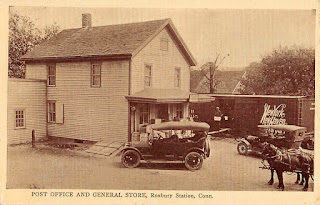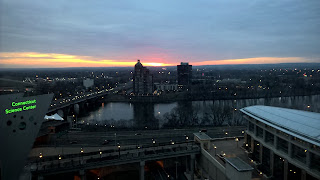 |
One successful Massachusetts Genealogical Council meeting saw
rapt audience members learn about DNA from Jennifer Zinck.
Photo courtesy of Linda MacIver. |
Genealogical societies are challenged today with the
declining membership of old gray heads like mine. The challenges we face
include the rise of DNA, and the rise of the webinar and podcast. We’ve got
mentorship, experience, friendship, and a regular reason to get out of bed on a
Saturday morning and see other people face-to-face. How do we sell our
society’s wonderful positives?
The speakers for the Wednesday Society Management Day are
presenting ideas in four areas of proven excellence.
·
8:45a.m. – 9:30 a.m. – Registration and Welcome
·
9:30 a.m. – 10:30 a.m. – Kelli Jo Bergheimer,
“How Do We Start a DNA Interest Group?” Have you thought about starting any
type of Interest Group for your society? Come and learn tips to build a
successful program.
·
10:45 a.m. – 11:45 a.m. – D. Joshua Taylor,
“Creating, Packing, and Sharing Your Society to Non-Genealogists” (Speaker
sponsored by NYG&BS). This session will discuss ideas and tools to assist
you in introducing your genealogical society to your local community –
especially for those who have little or no expressed interest in genealogy.
·
Noon – 1:15 p.m. Lunch, Daniel Horowitz, “DNA
Matching Technology, A New Frontier in Genealogy.”
·
1:30 p.m. – 2:30 p.m. – Daniel H. Earl, “The
Next Generation: Involving Youth in Your Society.” Who will be around to run
your society in 25 years? This lecture will look at how to involve the next
generation.
·
2:45 p.m. – 3:45 p.m. – Jen Baldwin, “The Social
Media Manager in Today’s Society.” What – exactly – is a social media manager
and does your society need one? This is a growing professional field, and
societies can learn to convert the position to assist your non-profit
organization, and greatly expand your reach on social media.
I caught up with two of our speakers to learn how the
success of these ideas and techniques affected their societies.
Dan Earl was the first to get back to me. He had a success
story of his own.
 A society at which I
have spoken, was in need of someone to help them with their society's Facebook
page. They announced their needs at a meeting where the topic was DNA (which
tends to bring in more people), a young millennial (about 22) spoke up and said
that she'd be willing to help with the Facebook page, and has been doing a great
job. By waiting to announce their needs at a meeting where 'fresh blood' would
be attending, they were able to draw in more people. With their new social
media director, they've been able to use Facebook and other social media to
reach out to younger people and the average age of their society has dropped
from 70 to 50 in less than a year.
A society at which I
have spoken, was in need of someone to help them with their society's Facebook
page. They announced their needs at a meeting where the topic was DNA (which
tends to bring in more people), a young millennial (about 22) spoke up and said
that she'd be willing to help with the Facebook page, and has been doing a great
job. By waiting to announce their needs at a meeting where 'fresh blood' would
be attending, they were able to draw in more people. With their new social
media director, they've been able to use Facebook and other social media to
reach out to younger people and the average age of their society has dropped
from 70 to 50 in less than a year.
Dan also pointed out that we can get young people involved
in genealogy from the get-go. He shared a success story involving his daughter’s
second grade class.
My daughter's second grade class
was having a "culture week" where families could come in and talk
about their culture. My daughter asked me if I could come and talk about
Hungary (where my maternal grandmother is from). I of course agreed. My daughter
said that some of the other parents (from Ghana, Italy, Greece, England)
brought in food. Not to be outdone, I asked my daughter if she'd like to help
me make some Hungarian cookies. She of course, agreed. We spend a couple of
hours talking about her ancestors from Hungary and making cookies. When the
time came for the presentation in class, she was very excited to share the
cookies with her class and help me explain her family tree (that she insisted I
include in the presentation because she thought it was 'so cool').
Josh Taylor was the next to share his success story. Josh is
busy right now with bringing the society he directs, the New York Biographical
and Genealogical Society, to the RootsTech exhibit floor in Salt Lake City.
 The need for
genealogical societies to be alert and remain in touch with their community is
key. When the NYG&B became aware of the proposed restrictions to New York
City's birth and death records in 2017 we worked hard to spread the message
beyond our community. The situation required us to work with other
organizations, which included fellow genealogical societies, commercial
entities, historical societies, lineage organizations, museums, and others. The
result was the development of new alliances and relationships that have
continued to this day. In my session at NERGC, I will be speaking specifically
about working to brand your organization to those outside of the genealogical
community, a key aspect of responding to threats to records access, increasing
membership, and further establishing the relevance of any genealogical
organization.
The need for
genealogical societies to be alert and remain in touch with their community is
key. When the NYG&B became aware of the proposed restrictions to New York
City's birth and death records in 2017 we worked hard to spread the message
beyond our community. The situation required us to work with other
organizations, which included fellow genealogical societies, commercial
entities, historical societies, lineage organizations, museums, and others. The
result was the development of new alliances and relationships that have
continued to this day. In my session at NERGC, I will be speaking specifically
about working to brand your organization to those outside of the genealogical
community, a key aspect of responding to threats to records access, increasing
membership, and further establishing the relevance of any genealogical
organization.











